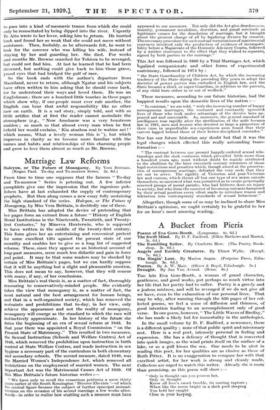Marriage Law Reforms
Halcyon, or The Future of Monogamy. By Vera Brittain. (Kogan Paul. To-day and To-morrow Series. 2s. &I.) FROM time to time one supposes that the famous " To-day and To-morrow " Series is petering out. A few inferior
pamphlets give one the impres.sion that the ingenious pub- lishers have at last exhausted the supply of contemporary
prophets. But then along comes a new essay fully sustaining the high standard of the series. Halcyon, or The Future of Monogamy, by Miss Vera Brittain, is decidedly one of these.
Miss Brittain has adopted the device of pretending that her pages form an extract from a future " History of English Moral Institutions in the Nineteenth, Twentieth, and Twenty- first Centuries," by Minerva Huxterwin, who is supposed to have written in the middle of the twenty-first century. This form gives her an entertaining and convenient pretext for some excellent tilts against the present state of our morality and enables her to give us a long list of suggested reforms. These, since they appear as an historical account of long-past measures, seem much less didactic and gain in force and point. It may be that some readers may be shocked by certain of Miss Brittain's pages, but we can hardly suppose that it will be anything but a slight and pleasurable emotion. This does not mean to say, however, that they will concur with many, if any, of her conclusions.
Miss Brittain's real thesis is, as a matter of fact, thoroughly reassuring to conservatively-minded people. She evidently takes the view that monogamy is, as a matter of fact, the
most natural and the best arrangement for human beings, and that in a well-organized society, which has removed the restraints and prohibitions that to-day, in her view, only achieve the appearance and not the reality of monogamy,
monogamy will emerge as the standard to which the race will instinctively approximate. In her history of the future she dates the beginning of an era of sexual reform at 1943. In that year there was appointed a Royal Commission " on the Present State of Matrimony." This resulted in two measures, the Sexual Instruction (Schools and Welfare Centres) Act of 1948, which removed the prohibition upon instruction in birth control at State Welfare Centres, and made instruction in sex
hygiene a necessary part of the curriculum in both elementary and secondary schools. The second measure, dated 1949, was the Married Women's Independence Act, which removed all
restrictions 'on the employment of married women. The next
important Act was the Matrimonial Causes Act of 1959. Of, this Miss Brittain's future historian writes :- ". We have only to recall the censorious pettiness a mere thirty years earlier of the South Kensington Divorce' Election which the central figure :femme the subject of further episccipal sWirnad versions on the occasion of his second Inarrittge. a few weeks after- wards—in order to realize how startling such a measure must have
appeared to our ancestors. Not only did the Act give drunkenness, insanity, permanent invalidisth, desertion, and _penal servitude as legitimate causes for the dissolution of marriage, but it brought about the greatest change of all by legalizing divorce by consent. The necessary procedure for such mutual terminations of matrimonial contracts involved only the production of evidence of incompati- bility before a Magistrate of the Domestic Advisory Courts, followed by a written statement to the effect that they wished to separate,. signed by both parties to the marriage."
This Act was followed in 1969 by a Trial Marriages Act, which legalized companionate and other forms of experimental matrimony, followed in 1974 by :
" the State Guardianship of Children Act, by which the increasing tendency of the State during the preceding fifty years to adopt the doctrine of parens pairiae was embodied in English law, and the State became a third, or super-Guardian, in addition to the parents, of any child born either in or out of wedlock."
These measures, according to our future historian, had the happiest results upon the domestic lives of the nation :- " In contrast," we are told, " with tho increasing number of happy monogamous marriages, the confused and constantly uprooted lives of those who took undue advantage of the divorce laws ap- peared sad and unenviable. As, moreover, the general standard of intelligence rose rapidly after the sterilization of tho unfit became law in 1981, men and women who devoted so large a proportion of their time to unprofitable sex-experiences soon found that their careers lagged behind those of their better-disciplined comrades."
Nor has our future historian any doubt but that it was the legal changes which effected this really astounding trans- formation :-
" The contrast between our present happily-ordered sexual rola- tionships and the dark confusion which prevailed little more than a hundred years ago, must without doubt be mainly attributed to the abolition by the later twentieth century reformers of those legal restrictions and penalties which, though aimed at the preserva- tion of monogamous marriage, defeated the very ends that they set out to servo. Tho rigidity of Victorian and post-Victorian law and custom, which thrust all but one type of sex union outside themselves, so narrowed what was permitted as to create perpetually renewed groups of moral pariahs, who had hitherto done no injury to society, but who from the moment of becoming outcasts hampered by their actual position every effort made to introduce reason and toleration into contemporary standards of sexual behaviour."
Altogether, though some of us may be inclined to share Miss Brittain's optimism, we ought certainly to be grateful to her for an hour's most amusing reading.












































 Previous page
Previous page